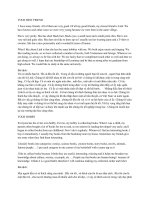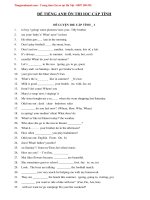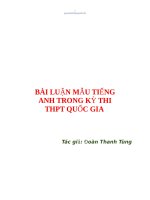đề tiếng anh ôn thi THPTQG
Bạn đang xem bản rút gọn của tài liệu. Xem và tải ngay bản đầy đủ của tài liệu tại đây (75.09 KB, 9 trang )
Mark the letter A, B, C, or D on your answer sheet to indicate the word whose underlined part differs from the
other three in pronunciation in each of the following questions
Quest ion1
A. event
B. between
C. object
D. record
Question 2. A. wicked
B. mixed
C. needed
D. learned
Mark the letter A, B, C, or D on your answer sheet to indicate the word that differs from the other three in the
position of the primary stress in each of the following questions.
Question 3. A. uncertainty
B. activity
C. prosperity
D. unemployment
Question 4. A. produce
B. market
C. urban
D. report
Mark the letter A, B, C, or D on your answer sheet to indicate the correct answer to each of the following
questions.
Question 5. His welcoming speech wasn’t good, _______ ?
A. wasn’t it
B. was he
C. was it
D. wasn’t he
Question 6. Some younger people nowadays tend to be indifferent _______ burning environmental problems.
A. to
B. at
C. with
D. from
Question 7. Using this polish on your car will give its surface an _______ shine.
A. attraction
B. attractive
C. unattractive
D. attractively
Question 8. When learning a foreign language, keeping well-ordered vocabulary notes is _______.
A. paramount
B. uppermost
C. lugged
D. selective
Question 9. The visit to my old school _______ an early memory of my favourite teacher, Mr. Bell.
A. honour
B. jog
C. trigger
D. repress
Question 10. Over the last forty years, psychologists _______ three methods which consistently improve memory
for words.
A. found
B. had found
C. will have found
D. have found
Question 11. To my surprise, she earns _______ my older brother.
A. much money than
B. as much money as
C. more money
D. the most money
Question 12. My computer is being repaired. I don’t know how I’m going to _______ without it.
A. go off
B. come down with
C. take up
D. get by
Question 13. He _______ from driving after picking up too many points on his licence.
A. disqualified
disqualified
B. will disqualify
C. was disqualified
D. had been
Question 14. Tim sold his _______ bicycle to have enough money for his favourite handheld electronic game.
A. German new black
B. black new German
C. new black German
D. German black new
Question 15. _______ from the disease, she’s more aware of the importance of taking regular
exercise.
A. Having recovered
B. Recover
C. To recover
D. Being recovered
Question 16. Suesan is embarking on a new career as an air stewardess _______ she’s dissatisfiedwith her
previous job.
A. due to
B. though
C. because
D. in spite of
Question 17. Trekkers should be prepared to _______ it as there are few facilities in remote areas.
A. struggle
B. rough
C. succumb
D. tolerate
Question 18. Soaring prices mean that many prospective buyers will reach the end of their _______ as they can
no longer afford to buy their wanted properties.
A. wit
B. rope
C. path
D. road
Question 19. We ran out of the house to see what was happening _______ .
A. until we hear the deafening noise out in the street
B. prior to hearing the deafening noise out in the street
C. after we had heard the deafening noise out in the street
D. as soon as we have heard the deafening noise out in the street
Mark the letter A, B, C, or D on your answer sheet to indicate the word(s) CLOSEST in meaning to the
underlined bold word(s) in each of the following questions.
Question 20. The scientists are working on a drug capable of arrestingthe spread of cancerous cells.
A. catching
B. grasping
C. curbing
D. seizing
Question 21. The best way to travel around London is to stand at the side of the road and haila cab.
A. beckon
B. call
C. wave
D. summon
Mark the letter A, B, C, or D on your answer sheet to indicate the word(s) OPPOSITE in meaning to the
underlined word(s) in each of the following questions.
Question 22. Becca gave a hilariousaccount of her teenage years.
A. uproarious
B. thrilling
C. confused
D. depressing
Question 23. If you don’t study harder there is no way that you will make the grade.
A. perform well
B. pass with flying colors
C. let your parents down
D. fail to get good results
Mark the letter A, B, C, or D on your answer sheet to indicate the most suitable response to complete each of
the following exchanges.
Question 24. John and Jack are talking about how lessons are conducted via the Internet.
John: “Distancing learning is truly convenient nowadays.”
Jack: “ _______ . This way of studying hinders our ability to interact with classmates.”
A. Precisely
B. Fair enough
C. Can you say that again?
D. I hardly think so
Question 25. Michelson is at the travel agency.
Michelson: “How much is the tour price?”
Travel agent: “ _______ .”
A. You don’t need to pay any fees in advance
B. We only accept cash
C. 18 pounds for each person
D. There will be a cancellation fee
Read the following passage and mark the letter A, B, C, or D on your answer sheet to choose the word or
phrase that best fits each of the numbered blanks from 26 to 30.
A SUCCESS STORY, OR IS IT?
Success, like beauty, lies in the eye of their beholder. How one person chooses to define it can be very
different from how others perceive it. For some people, it’s earning a fortune, while for (26) _______ it’s working
in a voluntary position helping those less fortunate. It’s also relative rather than absolute because the person who
masters a new skill has achieved success in their terms just as much as the self-made millionaire.
Ironically, there may also be a(n) 27 _______ contradiction in the term. After all, an actress who has a
glamorous life and seems to have everything she wants may actually be troubled by the loss of her private life as
paparazzi (28) _______ her personal space.
It also has something to do with the length of time success lasts. Many young people are happy with shortterm fame but (29) _______ it’s true that reaching that one goal might be comparatively straightforward,
maintaining that success is often much harder. And surely, it’s long-term success (30) _______ is ultimately the
most satisfying and also the most enviable?
(Adapted from Gold Advanced Exam Maximiser by Lynda Edwards and Jacky Newbrook)
Question 26.
A. another
B. few
C. others
D. much
Question 27.
A. complete
B. separate
C. individual
D. underlying
Question 28.
A. evade
B. invade
C. distract
D. extract
Question 29.
A. despite
B. even
C. although
D. however
Question 30.
A. it
B. that
C. which
D. when
Read the following passage and mark the letter A, B, C, or D on your answer sheet to indicate the correct
answer to each of the questions from 31 to 35
How do you feel about nature? After spending hours indoors, do you often like going outside for a walk? Or
if you work for hours at your office desk, do you feel better when you take a break and visit your local park? Most
people think that nature is good for us; itis good for our bodies and good for our brains. However, humans are
spending more time inside and less time outside. For example, the number of visitors to Canada’s national parks is
getting lower every year. And in countries such as the USA, only 10% of teenagers spend time outside every day.
Many doctors feel that this is a problem in the twenty - century, and that is making our physical health worse.
As a result, some doctors are studying the connection between nature and health: one example of this is the
work Dr Matilda van den Bosch in Sweden. The doctor gave people a maths test. During their test, their heart rate
was faster. After the test, one group of people sat in a 3D-virtual-reality room for fifteen minutes with pictures and
sounds of nature. Their heart rates were slower than people in the other group. The virtual contactwith nature
helped them feel more relaxed. Another good example of how nature is good for health comes from Canada. In
Toronto, researchers studied about 31,000 people living in cities. Overall, they found that healthier people lived
near parks.
Because of studies like these, some countries and cities want nature to be part of people’s everyday life. In
Dubai, for example, there are plans for a new shopping mall with a large garden so shoppers can relax outside
with trees, plants and water. In some countries, such as Switzerland, “forest schools” are popular, schoolchildren
study their subjects in the forests and do lots of exercise outside. And South Korea is another good example: it has
new forests near its cities and around 13 million people visit these forests every year. So, after building cities so
long, it’s now time to start rebuilding nature.
(Adapted from Life Pre-Intermediate by John Huges, Helen Stephenson and Paul Dummett)
Question 31. What is the most suitable title for the passage?
A. Prime examples of bringing nature to schools
B. Nature rebuilding
C. Nature is good for you
D. A test to measure humans’ heart rate
Question 32. According to paragraph 1, people nowadays tend to_______
A. go outside to get fresh air
B. sit at their own desks
C. lead sedentary lifestyles
D. have better physical health
Question 33. The word “it” in paragraph 1 refers to _______
A. park
B. nature
C. fresh air
D. water
Question 34. The word “contact” in paragraph 2 mostly means ______
A. connection
B. avoidance
C. touch
D. approach
Question 35. Which of the following is NOT mentioned in the paragraph?
A. Every year, the number of tourists to the National Parks of Canada is declining.
B. Doctors say our physical health is made worse by food choices and stress.
C. When they are in touch with nature, people feel more comfortable.
D. Students study in the forests in some countries and do a lot of exercise outside.
Read the following passage and mark the letter A, B, C, or D on your answer sheet to indicate the correct
answer to each of the questions from 36 to 42
Where brainpower is concerned, the old edict of 'use it, or lose it' holds true from the start. Babies who
receive love and encouragement from their parents develop the neural connections they need to get on in life. But
what happens to those who fail to get this support? Do they grow up to be less bright than their nurtured peers? It
would be comforting to believe that deprived children escape long-term damage by being too young to speak, or
know any different, but the evidence suggests otherwise. At a recent meeting of the Royal Society of Medicine,
medics were shown slides taken with a powerful scanner comparing the brains of 'normal' three-year-olds with
those who had been raised in deprivation or in orphanages. The work was done by Dr Bruce Perry of the Child
Trauma Academy in Houston, Texas. The scans showed that the frontal-temporal areas of the brain, those
responsible for personality and enabling a person to display and regulate emotions, showed little activity.
For years, scientists have known that animals reared in enriched environments have larger and more complex
brains than animals that grow up in deprivation, so experts like Perry anticipated that the same would hold true for
humans. However, it is only now, thanks to powerful scanners that allow this theory to be put to the test, that the
damage is clearly visible. Perry explains the reason for the abnormality is that the brain develops in a 'usedependent' way, growing, organising and working according to experience. With the right stimulation, the brain
makes the connections it needs. Without it, synapses, junctions between the neurons used to transport the brain's
messages, literally dissolve. “Adverse experiences play a vital role in organising the neural system in the
developing brain,” says Perry; in other words, ill- treatment in infancy leads to faulty wiring in the brain.
Significantly, the rate at which new synapses form is greatest in the first eight months of life.
Fortunately, different parts of the brain develop at different rates, so the damage may be confined to the parts
that were actively organising at the time of stress or neglect. Perry describes these times as “windows of
opportunity” that exist for different brain functions. If the connections between neurons are not developed at the
critical period, they may not develop at all. Synapses associated with vision are most active when a child to eight
months. A baby born with cataracts, removed at the age of two, will remain blind, as the window of opportunity
has passed.
Interaction between the child and its carers is vital to teach the brain to function normally. By playing with
and talking to her child, the mother distracts the infant from a bombardment of competing noises. This
communication trains a section of the brain to regulate emotions so the child is able to function day- to-day
without being a hostage to impulses and feelings.
Yet, despite the damage caused by stress and trauma in childhood, Perry, like most clinicians, is optimistic
that intervention can help, as the cortex, the grey matter responsible for high level brain function, is malleableand
capable of changing. He is supported in this belief by child psychiatrist Dr Dora Black, founder of the Traumatic
Stress Clinic in London, who works with severely traumatized children. She claims neurological evidence is
available that shows that, although trauma can affect the speech area in the brain, this function can return if the
child receives help early enough. “Unfortunately,” admits Perry, “what we don’t know is how much deprivation is
needed to prevent the recovery of normal expression of various emotional, cognitive or social skills.
(Adapted from Upstream Advanced by Virginia Evans and Lynda Edwards)
Question 36. Which best serves as the title for the passage?
A. Brain damages among children
children?
B. How to intervene trauma encountered by
C. How does the brain work?
D. Learning to live
Question 37. The word “dissolve” in paragraph 2 mostly means ________
A. process
B. tackle
C. disappear
D. decay
Question 38. According to the passage, recent evidence suggests that ________
A. babies do not respond to verbal communication.
B. babies who are orphaned will grow up to be less bright than those with parents.
C. babies’ brains are not fully developed at birth.
D. babies deprived of love and care do not suffer any long term emotional damage.
Question 39. The word “it” in paragraph 2 refers to ________
A. brain
B. right stimulation
C. powerful scanner
D. theory
Question 40. The word “malleable” in paragraph 5 is closest in meaning to ________
A. strong
B. stiff
C. flexible
D. vigorous
Question 41. Which of the following is true, according to the passage?
A. The part of the brain that deals with vision might never function properly if not activated before the age of
eight months
B. Scientists were only recently able to prove the effects of emotional deprivation on children’s brainswith the aid
of conventional technology
C. Research conducted on animals helped to shed light on the theory of deprived children
D. Children raised in harsh conditions tend to suffer from emotional inflexibility
Question 42. Which of the following can be inferred from the passage?
A. The effects of childhood trauma on speech can be reversed
B. Interacting with very young children will help to prevent them from being over-sensitive
C. Children’s eyesight will become deteriorated when they reach the age of two
D. The brains of animals and humans work in the same way
Mark the letter A, B, C, or D on your answer sheet to indicate the underlined part that needs correction in each
of the following questions.
Question 43. The children jeered their classmate in the schoolyard with the crucialchant of “Suzy is the teacher’s
pet!”
A. jeered
B. crucial
C. chant
D. teacher’s pet
Question 44. My parents earn a modest income and were unable to send me to public school.
A. earn
B. income
C. to send
D. public
Question 45. The project is almostcompleted and needs very little work to finish them off.
A. almost
B. completed
C. little
D. them
Mark the letter A, B, C, or D on your answer sheet to indicate the sentence that is closest in meaning to each of
the following questions.
Question 46. “I spent a large amount of money on this valueless book.” said Falla.
A. Falla denied spending a large amount of money on that valueless book.
B. Falla promised to spend a large amount of money on that valueless book.
C. Falla admitted having spent a large amount of money on that valueless book.
D. Falla regretted not having spent a large amount of money on that valueless book.
Question 47. This is the first time I have ever seen such a spectacular scene.
A. I saw such a spectacular scene many times ago.
B. I have never seen a spectacular scene like this before.
C. I have seen such a spectacular scene for many times.
D. I have never saw such a spectacular scene before.
Question 48. I’m certain that Johny used his smartphone in the exam as he finished it in just 5 minutes.
A. Johny can’t have used his smartphone in the exam as he finished it in just 5 minutes.
B. John needn’t have used his smartphone in the exam as he finished it in just 5 minutes.
C. Johny might have used his smartphone in the exam as he finished it in just 5 minutes.
D. Johny must have used his smartphone in the exam as he finished it in just 5 minutes.
Mark the letter A, B, C, or D on your answer sheet to indicate the sentence that best combines each pair of
sentences in the following questions.
Question 49. Daisy got depressed. She couldn’t do anything but cry all day.
A. Had Daisy not got depressed, she could do something but cry all day.
B. Not only did Daisy get depressed but she also did nothing but to cry all day.
C. Such was Daisy’s depression that she could do nothing but cry all day.
D. Suppose that Daisy got depressed, she would do nothing but cry all day.
Question 50. Joe is not here with us. He will know how to fix this technical issue.
A. Provided that Joe is here with us, he won’t know how to fix this technical issue.
B. Joe will know how to fix this technical issue even if he is not here with us.
C. We wish Joe were here with us and fix this technical issue.
D. If only Joe were here with us to help fix this technical issue.









